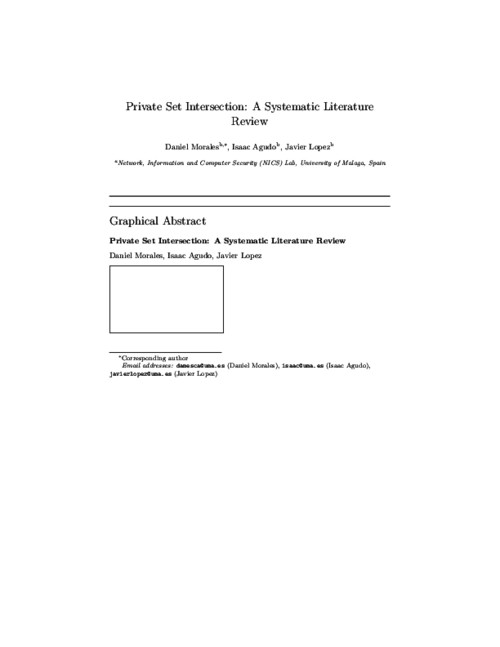| Title | Private set intersection: A systematic literature review |
| Publication Type | Journal Article |
| Year of Publication | 2023 |
| Authors | D. Morales, I. Agudo, and J. Lopez |
| Journal | Computer Science Review |
| Volume | 49 |
| Number | 100567 |
| Date Published | 05/2023 |
| Publisher | Elsevier |
| Place Published | ScienceDirect |
| Type of Article | Review |
| ISSN Number | 1574-0137 |
| Keywords | privacy, Private set intersection, Secure Multiparty computation, security |
| Abstract | Secure Multi-party Computation (SMPC) is a family of protocols which allow some parties to compute a function on their private inputs, obtaining the output at the end and nothing more. In this work, we focus on a particular SMPC problem named Private Set Intersection (PSI). The challenge in PSI is how two or more parties can compute the intersection of their private input sets, while the elements that are not in the intersection remain private. This problem has attracted the attention of many researchers because of its wide variety of applications, contributing to the proliferation of many different approaches. Despite that, current PSI protocols still require heavy cryptographic assumptions that may be unrealistic in some scenarios. In this paper, we perform a Systematic Literature Review of PSI solutions, with the objective of analyzing the main scenarios where PSI has been studied and giving the reader a general taxonomy of the problem together with a general understanding of the most common tools used to solve it. We also analyze the performance using different metrics, trying to determine if PSI is mature enough to be used in realistic scenarios, identifying the pros and cons of each protocol and the remaining open problems. |
| URL | https://www.sciencedirect.com/science/article/pii/S1574013723000345 |
| DOI | 10.1016/j.cosrev.2023.100567 |
| Citation Key | morales2023psi |
Private set intersection: A systematic literature review
Paper File:
https://nics.uma.es:8082/sites/default/files/papers/morales2023psi.pdf
Supported by BIG(PRIV)DATA SecTwin 5.0
